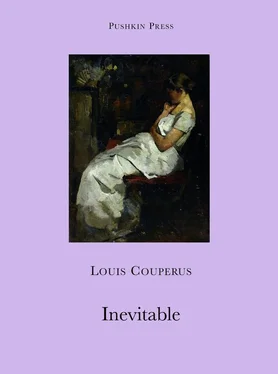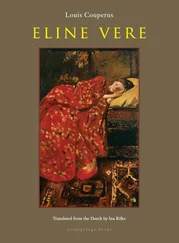“Stay with me in the drawing-room …”
“I’m going for a walk with the baroness,” replied Cornélie.
“That German lady?”
“Yes.”
“Does she belong to the nobility?”
“I fancy she does.”
“Are there many people from the nobility in this pensione ?” asked Miss Hope eagerly.
Cornélie laughed.
“I don’t know. I only arrived here this morning.”
“I think there are. I’ve heard that there are lots of members of the nobility here. Are you a member of the nobility?”
“I was!” laughed Cornélie. “But I had to relinquish my title.”
“What a shame!” cried Miss Hope. “The nobility is so sweet. Do you know what I have? An album of coats-of-arms, of all sorts of families, and another album of samples — silk and brocade of every ball gown of the queen of Italy … Would you like to see it?”
“I’d love to,” laughed Cornélie. “But now I must put my hat on.”
She went off and returned in her hat and cape: the German ladies and Rudyard were already waiting in the vestibule and asked why she was laughing. She told them about the album of samples of the queen’s evening gowns, which caused great merriment.
“Who is he?” she asked the baroness, as they walked on ahead down the Via Sistina; the young baroness followed with Rudyard.
She found the baroness charming, but was struck, in this German woman from an aristocratic military background, by a cold, cynical view of life not exactly typical of her Berlin environment.
“I don’t know,” replied the baroness with some indifference. “We travel a lot. At the moment we have no house in Berlin. We want to enjoy our trip. Mr Rudyard is very nice. He helps us with all kinds of things: tickets for a papal mass, introductions here, invitations there. He appears to have considerable influence. What do I care who or what he is? Else feels the same. I take what he has to offer here and apart from that I don’t delve too deeply into him …”
They walked on.
The baroness took Cornélie’s arm.
“My dear child, don’t think us too cynical. I scarcely know you, but I like you. Odd, isn’t it, on our travels, suddenly to be sitting down to a pensione set menu with scrawny chicken. Don’t think us bad, or cynical. Oh, perhaps we are. Our cosmopolitan, dissolute life free of duty makes one like that: ignoble, cynical and selfish. Very selfish. Rudyard does us many favours. Why shouldn’t I accept them? I couldn’t care less who or what he is. I’m not putting myself under an obligation to him.”
Cornélie looked round involuntarily. In the street, almost completely dark, she saw Rudyard and the young baroness, almost whispering and acting mysteriously.
“And does your daughter feel the same?”
“Oh yes. We’re not under any obligation to him. We don’t even care greatly for him, with his pock-marked face and black nails. We simply accept his introductions. Do likewise. Or … don’t. Perhaps it would be nobler of you not to. I, I’ve become very selfish, through our travelling. What difference does it make to me …”
The dark street seemed to invite confidences, and Cornélie understood a little of that cynical indifference, unusual in a woman brought up amid narrow concepts of duty and morality. It was not noble; but was it not weariness at life’s tribulations? Whatever the case, she had a vague understanding of that indifferent tone, that nonchalant shrug of the shoulders …
And they turned past Hôtel Hassler and approached the Villa Medici. The full moon poured out its flood of white light, and Rome was bathed in the blue-white nocturnal glow. From the full basin of the fountain, beneath the black holm oaks, whose foliage provided an ebony frame for the painting of Rome, the abundant water splashed noisily down …
“Rome must be beautiful,” said Cornélie softly.
Rudyard and the young baroness had caught up, and heard Cornélie’s words.
“Rome is beautiful,” he said earnestly. “And Rome is more. Rome is a great consolation to many people.”
In the bluish moonlit night his words struck her. The city seemed to be undulating mystically at her feet. She looked at him: he stood before her, with his black coat, without much linen on show: always a fat, polite gentleman. His voice was very piercing, with a rich tone of conviction. She looked at him for a long time, unsure of herself and vaguely sensing an approaching suggestion, but mutely hostile.
Then he added, as if not wanting her to dwell too long on what he had said:
“A great consolation, for many people … since beauty consoles …”
And she found his last remark an aesthetic truism, but he had meant her to find it so.
CORNÉLIE FOUND THE FIRST DAYS in Rome extremely exhausting. She did too much, as everyone does who has just arrived; she wanted to embrace the whole city at once, and the distances, though covered in a carriage, wore her out. In addition she was constantly disappointed, in paintings, in statues, in buildings. At first she did not dare admit those disappointments to herself, but one afternoon, dog-tired, after a painful disappointment in the Sistine Chapel, she admitted it. Everything she saw and already knew from her studies was a disappointment. She decided not to see anything else for the time being. And after her gruelling days of going out in the morning, out in the afternoon, it was a luxury to abandon herself to the subconscious stream of days. She stayed home in the mornings in a peignoir , in her cosy, lofty birdcage of a sitting-room, wrote letters, dreamed a little, her arms folded round her head, read Ovid, Petrarch, listened to some street musicians, who with trembling tenor voices, to the plaintive twang of their guitars filled the quiet street with the sobbing passion of music. At lunch she felt she had been fortunate in her choice of pensione : in her corner at table she found the Baroness Von Rothkirch with her nonchalant condescension towards Rudyard interesting, as she saw how travel can uproot someone from their narrow circle. The young baroness, who did not worry at all about life and just painted and sketched, interested her when she whispered to Rudyard, so that Cornélie did not understand. Miss Hope was so naive, so childishly scatterbrained, that Cornélie could not see how Hope Senior, the rich stocking-manufacturer over there in Chicago, simply let this girl travel alone with her excessive monthly allowance and total lack of worldliness and understanding of people; and Rudyard himself, although she was sometimes repelled by him, fascinated her despite that repulsion. So although she had not struck up a deeper friendship with any of these table companions, there were people around her to whom she could talk, and the table conversation was a diversion from the whole day’s loneliness.
For in these days of weariness and disappointment she took only a short afternoon walk down the Corso or the Pincio, then returned home, made tea for herself in her silver teapot, and daydreamed in front of the wood fire till it was time to dress for dinner.
And the well-lit dining-room with the Guercino ceiling was cheerful. The pensione was full: the marchesa was sleeping in the bathroom, having given up her own room. There was a constant buzz of voices at table, the waiters trotted about and spoons and forks clattered. The melancholy mood of so many restaurants with set menus was absent here. People knew each other and the bustle of Roman life, the oxygen of Roman air, seemed to have injected vitality into their gestures and conversations. Amid that vitality the two scruffy aesthetic ladies stood out with their unchanging attitude: always in evening dress, the woollens, the beads, the reading of the thick tome; the angry looks because people were talking.
Читать дальше












